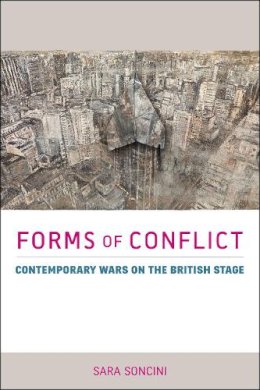
Forms of Conflict: Contemporary Wars on the British Stage (Exeter Performance Studies)
Sara Soncini
Forms of Conflict is a full-length study of the representation of contemporary warfare on the British stage and investigates the strategies deployed by theatre practitioners in Britain as they meet the representational challenges posed by the ‘new wars’ of the global era.
It questions how dramatists have responded aesthetically to the changing nature of conflict, focusing on plays written and performed after the September 11 terrorist attacks. Soncini examines how the works of playwrights such as Caryl Churchill, David Hare, Martin Crimp and Simon Stephens have provided an interpretative means to enlarge our understanding of the new patterns of conflict, ensuring theatre’s continued cultural and political relevance.
Forms of Conflict explores the relationship between new forms of warfare and new forms of drama, illustrating what dramatic form can reveal about the post-9/11 landscape and complementing a rapidly growing field of contemporary war studies.
The appendix contains a complete list of war-related plays staged in Britain between 1990 and 2010, with a brief description of their topic and approach.
Product Details
About Sara Soncini
Reviews for Forms of Conflict: Contemporary Wars on the British Stage (Exeter Performance Studies)
Alessandra Marzola, University of Bergamo
Iperstoria, Indice Numero XI - Spring/Summer 2018
In this rich and expansive study, Sara Soncini grapples with a timely question: how have theatre practitioners – particularly playwrights – represented and responded to the theatrical challenges of contemporary globalized and highly mediatized warfare? Soncini weaves together an intricate and insightful analysis of the reshaping of dramatic form that has occurred alongside conceptual shifts in contemporary warfare. Soncini concludes the book with a thorough and much appreciated appendix that catalogues war-centric plays that premiered in the United Kingdom between 1991 and 2011, and provides information including title, playwright, dates and warscape. Rather than a single, unified explanation, Forms of Conflict offers a multifaceted approach to navigating recent theatrical responses to war. The study is authoritatively argued, far-reaching in its scope and a welcome contribution to the fields of theatre and performance studies. Furthermore, its interdisciplinary approach yields an impact in several diverse fields including globalization studies, trauma studies and postmodern cultural studies.
Alison Christy, University of Kansas
Theatre Research International, 43.1, Oct. 2017
With Forms of Conflict, Soncini adds an art-based focus to the growing literature of contemporary war studies and also connects theater studies to political science research into the rhetorical strategies of war. Using detailed descriptions and persuasive close reading of recent performances, Soncini paints a thorough picture of contemporary British theater and offers a timely reminder of art’s power to disrupt the discourses of war. Forms of Conflict contains rich close readings of scripts and meticulous descriptions of performances. Soncini has a knack for imagery that draws readers into the performance experience while simultaneously directing them to key points in her analysis. Even if the reader is unfamiliar with the scripts or productions Soncini discusses, her colorful depictions form a clear picture. Soncini also provides comprehensive historical context for events like the Bloody Sunday inquiry or the July 7, 2005 bombings in London, and this attention to details strengthens her argument.
Susanne Shawyer, Elon University
Journal of British Studies, Volume 56, Issue 4, October 2017
This is a timely and meticulously researched volume on the representation of war on the British stage written around or after the September 11 terrorist attacks. It confronts the aesthetic and political challenges of this representation by focusing on a select group of dramatists who have made significant contributions to British drama. There is a rapidly growing field of contemporary war studies in university arts, theatre and performance departments and this book would be a welcome addition to the range of texts already on offer. Dr Dawn Fowler, Senior Lecturer in Drama, University of the West of England
Dr Dawn Fowler, Senior Lecturer in Drama, University of the West of England
